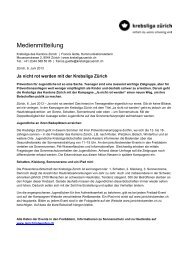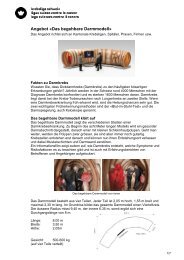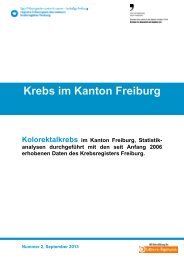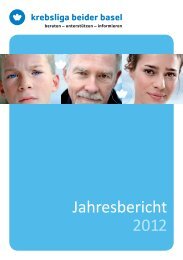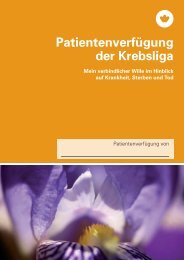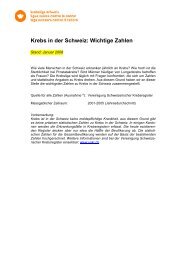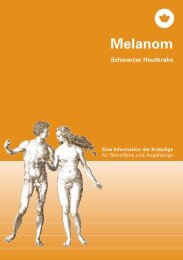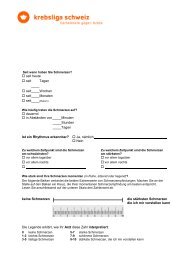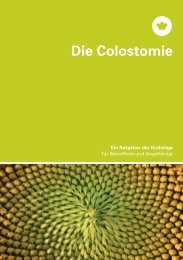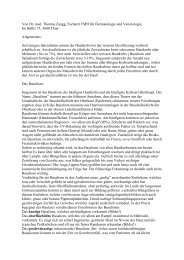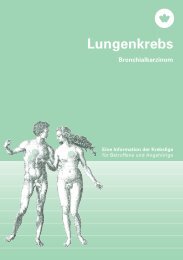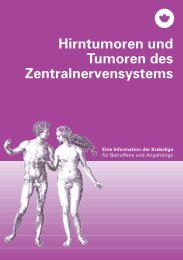Cancer Research in Switzerland - Krebsliga Schweiz
Cancer Research in Switzerland - Krebsliga Schweiz
Cancer Research in Switzerland - Krebsliga Schweiz
You also want an ePaper? Increase the reach of your titles
YUMPU automatically turns print PDFs into web optimized ePapers that Google loves.
of this study to ameliorate communication between<br />
health professionals and patients <strong>in</strong> the field of prostate<br />
cancer.<br />
Methods<br />
With this purpose <strong>in</strong> m<strong>in</strong>d, we tried to <strong>in</strong>corporate both<br />
the view of patients and the professionals <strong>in</strong>to the design<br />
of one study. Patients answered a questionnaire developed<br />
by an <strong>in</strong>ternational research team and consist<strong>in</strong>g of<br />
92 questions about prostate cancer and its treatment. Additionally,<br />
health professionals (urologists, oncologists,<br />
general practitioners, nurses, etc.) rated the same questions<br />
with regard to their importance for patients. The<br />
f<strong>in</strong>al sample of the study consisted of 128 patients and<br />
208 professionals from five cl<strong>in</strong>ics <strong>in</strong> the German-speak<strong>in</strong>g<br />
part of <strong>Switzerland</strong>.<br />
Results<br />
Patients varied greatly with regard to their judgements of<br />
prostate cancer topics. Overall, they considered around<br />
half of the almost 100 provided topics as essential for appropriate<br />
<strong>in</strong>formation. However, some patients considered<br />
only a few questions as essential, whereas others<br />
rated almost all of the topics essential. Moreover, participat<strong>in</strong>g<br />
patients agreed only moderately on specific topics.<br />
This heterogeneity of rat<strong>in</strong>gs about what is important to<br />
know about prostate cancer is not only a patient phenomenon.<br />
On the contrary, even the health professionals varied<br />
greatly <strong>in</strong> judg<strong>in</strong>g what might be of significance for patients.<br />
Conclusions and suggestions<br />
Information needs with regard to treatment decisions of<br />
men with curable prostate cancer are broad but very <strong>in</strong>dividual,<br />
too. It seems hardly possible to reduce <strong>in</strong>formation<br />
about this disease to a core set of topics that could then<br />
be used to pr<strong>in</strong>t a small booklet. This would still result <strong>in</strong> a<br />
substantial number of men with <strong>in</strong>formation needs not<br />
sufficiently covered. The results of this study emphasize<br />
the function of dialogue between doctor/professional and<br />
patient <strong>in</strong> transferr<strong>in</strong>g <strong>in</strong>formation on a highly <strong>in</strong>dividual<br />
level. However, counsell<strong>in</strong>g of prostate cancer patients<br />
should not be controlled (only) by some standardized<br />
guidel<strong>in</strong>es but should overall consider the patients’ needs.




